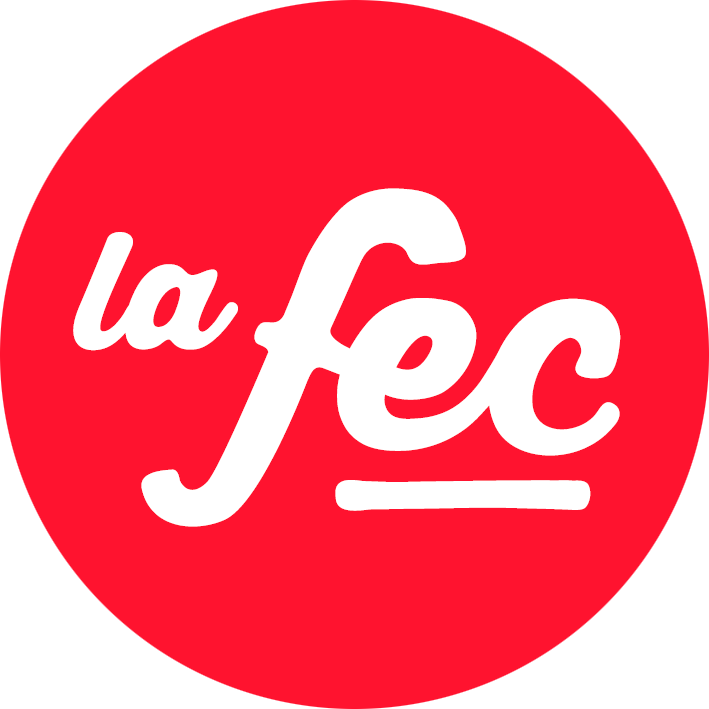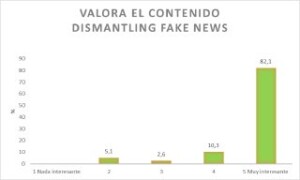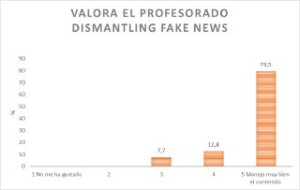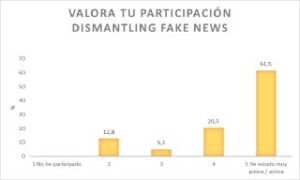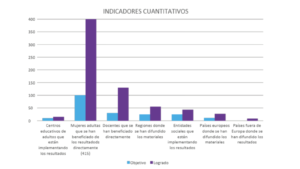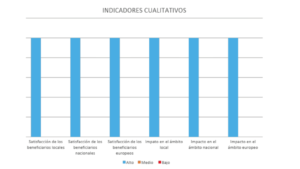In recent years, hate speech has thrived largely through the dissemination of fake news. Almost half of EU citizens (46% in 2016) are informed through social networks, and six out of ten tend to share these news items without having read them or checked their veracity.
Groups such as women at risk of exclusion are particularly susceptible to fake news, being an adult population over 55 years of age in a situation of exclusion and with low digital skills. This group has historically been relegated from public and educational spheres and therefore has lower digital skills and less training in the use of social networks and the internet.
Since 2020, due to the impact of the coronavirus, the use of new technologies and social networks as a window to the world has increased. This massive use of digitalisation as a passive information-seeking mechanism has further enabled the spread of fake news.
The project DISMANTLING FAKE NEWS TO STOP HATRED: EDUCATION FOR THE INCLUSION OF ADULT WOMEN IN RISK OF EXCLUSION, during 36 months, has generated a strategy to fight against these fake news through the training of adult women by means of a dynamic, attractive process capable of enhancing their capacity for critical thinking.
Since the incidence of fake news is a common concern of the European Parliament, we designed an initiative to promote the inclusion of women at risk of exclusion in the adult education system through innovative tools, adapted to the target group, and based on the analysis of fake news.
The objective was to generate in these women mechanisms to fight against hate speech through a series of effective tools to promote their training, the development of their digital skills, and a critical analysis capacity to reduce their digital divide.
GOALS
The objectives set forth by this project are consistent with the goals of the European Commission which aim to establish specific measures against misinformation through a European plan of action which will come into force in 2019 and can take place both in and outside of Europe in order to counteract the post truth campaign, or fake news.
This project also aims to contribute effectively to the following four common goals of the European Union:
-To make learning permanent and the mobility of education a reality.
-To improve the quality and effectiveness of education and training.
-To foster equality, social cohesiveness and active citizenship.
-To increase the creativity and innovation in the training of adults.
GOALS OF ERASMUS PLUS PROGRAM
-To promote the internationalization and cooperation of the member countries through the creation of stable European networks.
-To create innovative educational processes to strengthen the professional profile of the teachers of this field.
-To foster inclusion of groups at risk of exclusion such as women with barriers.
-To strengthen and amplify the opportunities of learning at a higher quality.
-To tackle discrimination, segregation, racism, intimidation and fake news.
ACTIVITIES
Fulfilling the objectives of this project, the partnership has worked directly to curb hate speech at European level by carrying out in a coordinated way – despite the difficulties – multiple activities in the different phases of the project. During these phases, we have successfully carried out the following activities:
TRANSNATIONAL MEETINGS
FIRST TRANSNATIONAL MEETING
This first transnational meeting was clearly affected by the 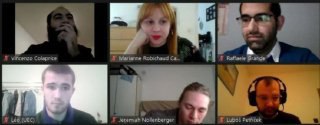 COVID-19 pandemic, since this unforeseen event and all the restrictions derived from it. Despite all the difficulties arising from the Pandemic, this meeting was finally held online on 21 March 2020.
COVID-19 pandemic, since this unforeseen event and all the restrictions derived from it. Despite all the difficulties arising from the Pandemic, this meeting was finally held online on 21 March 2020.
This meeting served to coordinate the work planned by the different areas and commissions and to adapt the methodology for the creation of the O1. READ-THINK-ACT: INTERACTIVE EDUCATIONAL PLATFORM FOR ADULT LEARNING THROUGH THE ANALYSIS OF FAKENEWS.
Finally, we carried out the evaluation of the preparation stage and the meeting itself.
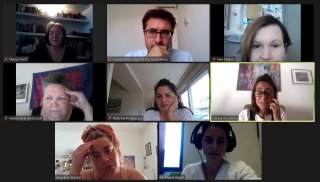 SECOND TRANSNATIONAL MEETING
SECOND TRANSNATIONAL MEETING
The second transnational meeting of the project was also held online on 7 July 2020, due to the restrictions and difficulties arising from the COVID pandemic, such as the closure of borders between some countries.
The participants were the project coordinators, responsible for the results and pilot tests, as this meeting was focused on the elaboration of the intellectual product, as well as the tangible and strategic results.
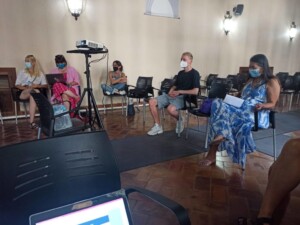 THIRD TRANSNATIONAL MEETING
THIRD TRANSNATIONAL MEETING
The THIRD TRANSNATIONAL MEETING took place in Seville on 17 July 2021. Since the beginning of the COVID-19 pandemic that affected and continues to affect the whole world, at that time the borders between countries were open again and we had the opportunity to meet face to face.
At this meeting, which focused on the elaboration of tangible and strategic results, as well as on the implementation of the O1, aspects such as the monitoring and evaluation of the activities carried out so far, the presentation of reports from the work areas or the distribution of pending activities were discussed.
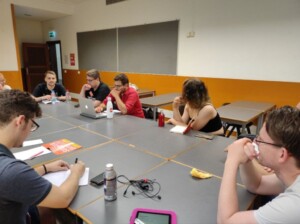 FOURTH TRANSNATIONAL MEETING
FOURTH TRANSNATIONAL MEETING
The FOURTH TRANSNATIONAL MEETING took place on 10 July 2022 in Aveiro (Portugal).
This meeting focused on the presentation of the finalised results, as well as the dissemination actions, especially the two multiplier events held in Alcorcón (Madrid) and Mieres (Asturias), and the distribution of tasks in order to ensure impact, dissemination and sustainability.
Thus, this meeting, which focused on the final presentation of the results, their dissemination and evaluation, allowed us to discuss some of the most relevant aspects of the project in view of its finalisation.
MULTIPLIER EVENTS
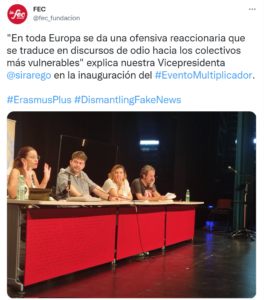 E1: COMMITTED AGAINST FAKE NEWS, FIGHTING AGAINST HATE MOVEMENTS.
E1: COMMITTED AGAINST FAKE NEWS, FIGHTING AGAINST HATE MOVEMENTS.
During the 1st and 2nd of July 2022, we held a multiplier event in Alcorcón (Madrid) which welcomed more than 110 participants, members of the Board of Directors of social associations, MEPs, foundations, institutional leaders, collectives, trade unions, adult education teachers and political leaders from all fields.
Among them we can highlight MEPs such as Sira Rego, the Director General for Equality (Clara Alonso) or Kontantinos Arvanitis and Marion Aubry, and the Minister for Consumer Affairs Alberto Garzón, among others.
This event consisted of a two-day seminar that brought together multiple spaces for meeting, debate, discussion and learning where, through formal and non-formal activities, a process of evaluation, improvement and dissemination of the results was generated.
This event not only managed to disseminate the results, but also to involve the multiplier agents, as experts in the project areas and in the evaluation of the results.
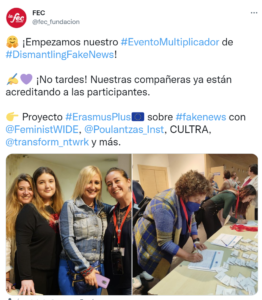 E2: READ-THINK-ACT: EDUCATION AS A TOOL AGAINST FAKE NEWS
E2: READ-THINK-ACT: EDUCATION AS A TOOL AGAINST FAKE NEWS
Due to the importance of multiplier events for the dissemination of the project, as well as to generate a great impact, we decided to carry out a second multiplier event.
This event took place in Mieres (Asturias) on 21 May 2022, and was attended by members of associations, foundations, institutions, teachers, beneficiary groups…
In this event, we not only presented the project and the results, especially the intellectual result O1 “READ-THINK-ACT”, but also held working groups by areas in which fake news from different fields (equality, hate speech towards the LGBTIQ community and women, environment…) were dealt with. These groups not only held workshops to work on detecting fake news and hate speech in our communities and then collectively develop alternative narratives from a rights-based approach, but also shared experiences of awareness-raising, analysis and development of alternative narratives. Specific discussion groups were also held with teachers of adults.
OTHER ACTIVITIES
– PILOT TESTING. Testing activities of the READ-THINK-ACT platform.
– ACTIVITIES FOR THE DEFINITION AND DEVELOPMENT OF RESULTS. Several virtual activities were carried out in each country to define the platform and its contents.
– SPECIFIC PREPARATION ACTIVITIES ON “FAKE NEWS”.
– ACTIVITIES of the OPERATIONAL MANUALS WITH THE PROJECT’S WORKING METHODOLOGY AND OTHER RESULTS.
– ACTIVITIES FOR THE CREATION OF THE PROJECT WEBSITE.
– BILATERAL MEETINGS AND DISSEMINATION ACTIONS, with which the partner entities made the project and the Erasmus+ Programme visible to other teachers and managers of non-participating entities.
– INTERNET AND SOCIAL NETWORK DISSEMINATION ACTIONS: through which the project has been disseminated reaching more women and other parts of this interested group, from other student profiles to families and the European society in general.
For the evaluation of the project we implemented a Quality Control System able to properly monitor and evaluate the progress, quality and achievement of the activities.
The evaluation of the quality of the results was one of the main priorities of the project. For this purpose, the following evaluation processes were chosen:
1.- EVALUATION AMONG THE BENEFICIARY GROUP. Several pilot tests were carried out virtually among adult women themselves (together with other adults in order to check the suitability of these among the male audience).
2.- EXTERNAL EVALUATIONS. Carried out by teachers from outside the partnership.
3.- INTERNAL EVALUATIONS. Continuous evaluations by the Control Commission together with discussion groups of the teaching teams of the partner entities.
One of the most important points of this project, in addition to its high quality results, has been its capacity for impact at all levels. Specifically, we can point out the following results of the impact evaluation through quantitative and qualitative indicators:
TESTIMONIALS
Political decision-makers:
“There is growing concern in our municipality about the media powers we have as citizens and the harmful role that fake news plays in our democracies. We have received this project of the CHF with great interest and look forward to implementing it”.
Arturo Villar Villar, Mayor of Camprovín (La Rioja, Spain)
“As a councillor in a town council, I often find myself in the situation of talking to many neighbours who tell you about fears and problems that have more to do with fake news and the insecurity they generate than with reality. The materials I have found here will help me to know how to deal with this problem. Education is everyone’s business”.
Rubén Pérez Correa, Councillor in Vigo City Council (Galicia, Spain)
Teachers:
“From my work as a teacher of science subjects, I try to teach rational and scientific thinking. It is very frustrating to find that students replicate hoaxes and “magufadas”, but alarming when it affects public health, as we have seen with the COVID denialism. I hope that the materials I have learnt here will help me to improve my professional performance in this respect”.
Vicente Serrano García, teacher
“Well, of all the topics you have touched on in the section on vulnerable groups, the one I liked the most was the one related to feminism. Adolescents are exposed to messages of neo-machism that we teachers have to be able to counteract in the classroom”.
Dolores Ruiz Durán, teacher
“There are elements of linguistics and communication that you provide that are going to enrich my sociology classes, there are few things as important as teaching students to analyse news and discourse through critical thinking”.
Jesús Rodríguez Rojo, teacher
“I enjoyed the materials, I signed up for the course because I wanted to learn about fake news to be able to problematise philosophical concepts such as Truth in class and I have learnt much more than I expected”.
Luis Felip López-Espinosa
“It’s scary to think about how fake news manipulates our emotions. It is tremendously necessary that we provide ourselves with this type of training and tools”.
Cristina Rodríguez Prada, teacher
Students:
“I loved being able to debate with other colleagues. It is a participatory methodology that forces you to think about the news you are receiving”.
Ana Villaseñor
“Nobody teaches us how to do a reverse search or the fact-checking tools we have seen. I’m leaving much more “immune” than I came in to this epidemic of fakes news that we are experiencing”.
Gonzalo Bea
“In Europe and in scientific communication, it had long been detected that fake news was becoming a huge problem of disinformation and destabilisation. I hope to be able to pass these materials on to my European colleagues”.
Carla Perucca
“The NGO I work for is dedicated to finding solutions to homelessness. Our advocacy work improves with courses like this one where we learn that communication is a minefield and fake news are mines”.
Gonzalo Caro
“The examples of fake news were varied, the atmosphere participative and the materials very complete. Congratulations”.
Marina Valdés
FINAL VALORATION
INTELLECTUAL OUTPUT
READ-THINK-ACT: INTERACTIVE EDUCATIONAL PORTAL FOR ADULT LEARNING THROUGH THE ANALYSIS OF FAKE NEWS.
The main result of this project is the digital platform -READ-THINK-ACT (O1), an interactive educational platform for adult learning through the analysis of fake news adapted to computers, mobile devices and tablets, especially oriented to groups at risk of exclusion, in this case adult women with obstacles. The platform generates an innovative, attractive and motivating learning process for the development of the educational competences of the Initial Education Curriculum established in the Order ECD/651/2017 (and its counterparts in partner countries) for adult women at risk of exclusion.
To do all this, the educational portal has at its disposal:
– THE EDUCATIONAL RESOURCES “REAd, REAct”: open educational resources consisting of 12 study topics composed of 12 original didactic units, created in this project, developed by teachers and experts from the partner entities.
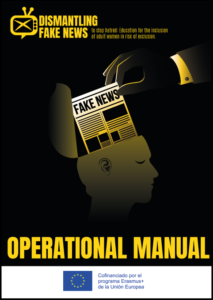 – Operational Manual: instructions about the philosophy and methodology behind Read-Think-Act to make it easier for other groups and organizations to replicate the course.
– Operational Manual: instructions about the philosophy and methodology behind Read-Think-Act to make it easier for other groups and organizations to replicate the course.
– A PUBLIC AREA aimed at denouncing fake news and exposing the real interests behind it.
– A PERSONAL AREA with specific spaces that include:
– Synchronous tools for collaborative work, such as the forum, with conversations between the users themselves and contributions from teachers in the form of guidelines or clarifications.
– Search engine for specific educational resources to facilitate news analysis processes.
– Tools for file sharing and asynchronous communication with tutors.
TANGIBLE AND NON-TANGIBLE RESULTS
In addition to the main Intellectual Product, non-tangible results have been generated, such as the exchange of experiences that improve the networking of the entities, and tangible results, such as innovative digital tools, materials developed through applications to share in the cloud, and effective materials to create new training processes with an impact on the beneficiary groups.
